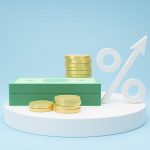It’s the million-dollar question today. Are we headed for a recession?
The economy is cyclical, and the days of low-interest rates are reversing as the Fed raises benchmark rates back towards historical averages, ending the period of record low-interest rates in which many borrowers took advantage of refinancing or could purchase their dream home.
In our last newsletter, we explained how inflation has affected the economy, including the housing sector. The Federal Reserve recently imposed a 75 basis point rate hike, and there are sure to be more increases coming in the future.
Will the Fed’s anti-inflationary policies push us into recession?
The good news. A recent Bloomberg survey found that over 80% of Americans believe a recession is coming this year, but only 30% of economists expect a recession to occur within the next 12 months. In other words, some economists do see us heading into recession sometime in the end of 2022 or in 2023. But others are more optimistic and hopeful that the Fed’s policies will result in a successful “soft landing”, heading off a recession like the Fed successfully executed in 1995.
In many ways, inflation is a self-fulfilling prophecy. When the stock market, suppliers, and consumers are spooked by news of inflation rates and tightening monetary policy, inflationary fears reinforce themselves as real increases in inflation. But a recession occurs due to many complex factors, not just inflation. In order to assess recession risk, experts consider a confluence of factors such as overall spending, economic growth slowdown, employment, and housing. After considering these factors, the majority of economists are much less fearful than the average American. We hope this is the time to “listen to the experts”!
The truth is, no one really knows what can happen, but on a positive note, we are in a much stronger position entering this down market than we were before prior recessions. Labor remains strong, American savings are coming off record highs, and the outlook for technology growth potential is higher than ever. There will be many opportunities to buy the lows as savvy investors navigate the cyclical nature of the economy.
What are the ways this can play out?
Scenario 1: the Goldilocks scenario, a soft landing.
In this ideal scenario, the worst of inflation passes as the Federal Reserve tightens monetary policy just enough to execute a soft landing, reversing inflation, and subsequent rate cuts can follow once the dust settles to rev the economy back up. Many economists anticipate that we will once again see rate cuts occurring in the latter half of 2023. Recent borrowers will see upcoming refinance opportunities, and home purchasing power will increase as credit restrictions and rates ease.
This scenario played out back in 1994 in the Alan Greenspan era, when the Fed progressively raised rates seven times to head off high inflation and successfully maneuvered a soft landing, avoiding recession. By the end of 1995, stocks were up 34% and the housing sector remained strong.
Janet Yellen, former Fed chair, anticipates this scenario. She remains optimistic that a recession is not inevitable, citing factors such as record high household savings during the COVID pandemic that will help sustain consumer spending, and near full employment in the labor economy.
Scenario 2: A shallow recession, avoiding long-term economic pain.
If the Federal Reserve progresses with steady rate hikes until inflation is under control, dipping the nation into shallow recession territory. There is a temporary period of slowed economic growth and increased unemployment, but strong indicators pull us out of recession quickly. Once inflation wanes, the Fed may reboot the economy with rate cuts in 2023. In this scenario, the housing market, while currently stagnating, will emerge relatively unscathed as borrower costs continue to meet expectations, home values stay on track, and rate cuts stimulate buyer activity, and refinancing options are revived.
This is considered by most surveyed economists to be the more likely scenario in the upcoming year.
Scenario 3: The economy experiences a deeper recession
A shrinking economy would likely lead to job losses, falling wages, and hard times for consumers and businesses. Housing would be destabilized and consumer spending would plummet.
In this scenario, we would see large drops in activity across all sectors, which the Fed will have to treat with a combination of monetary policies. Many industries would be sharply affected, and small businesses across sectors would certainly feel the crunch.
So far, there are no doom and gloom factors to indicate that we will hit the troubles of the Great Recession of 2009, as employment and household savings remain high, consumers maintain their spending levels despite changing spending patterns, and housing values are expected to sustain themselves well into 2023, and the central banks are able to limit the economic damage once the threat of inflation passes.
But a deeper recession is always a risk, due to unknown factors such as how the Russia-Ukraine war plays out, and what happens with energy prices.
In this scenario, business owners might consider taking cash-out financing options to cover their business overhead until the tide reverses. Meanwhile, all is not glum in a recession economy, as investors will see fantastic buying opportunities. Savvy real estate and portfolio investors will “buy the dip”, being well-poised for when the economic cycle returns to the upswing.
The bottom line. Nobody knows what is in the future for this economy, and there are many moving parts to watch, such as how quickly the recent rate hikes curb inflation; how the stock market and industries react to rate increases; turbulence in the European and Chinese economies; the Russia-Ukraine war; how consumers adapt their spend levels; and wages and employment. There are many political factors to watch as well. For example, President Biden recently asked Congress to approve a suspension of federal gasoline taxes to offset energy costs, while encouraging states to do the same.
While we at HP Mortgage don’t have a crystal ball, we do have borrowing options for loans of every type in a rapidly changing market, and can show you how to best maneuver your purchasing options to receive the most competitive rates and terms. In the case of a sustained recession, self-employed business owners would be wise to look at their refinancing and cash-out options to manage decreased sales, payroll costs, and use smart financing to weather a potential storm.
Looking for borrower information? Give us a call today, and our friendly loan officers will provide plenty of options for you as we all navigate the changing housing market.
We pride ourselves on specializing in non-conventional scenarios, with many options for real estate investors and self-employed borrowers, while providing the knowledge and service that experienced brokers can provide.




 NMLS# 1456273
NMLS# 1456273
